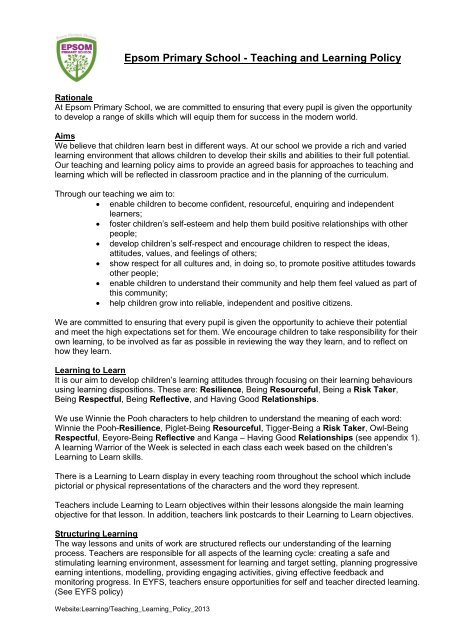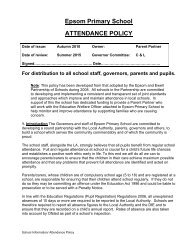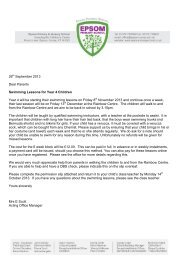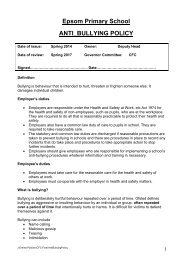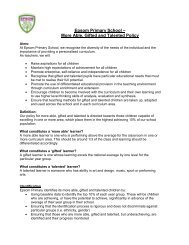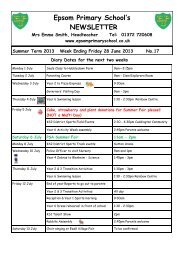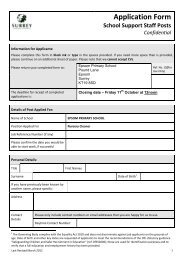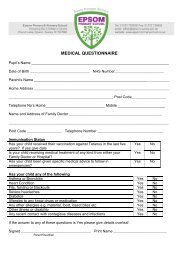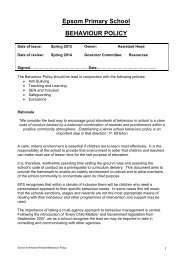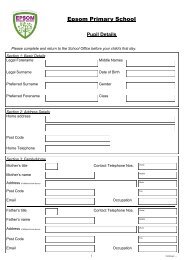Teaching and Learning Policy - Epsom Primary School
Teaching and Learning Policy - Epsom Primary School
Teaching and Learning Policy - Epsom Primary School
You also want an ePaper? Increase the reach of your titles
YUMPU automatically turns print PDFs into web optimized ePapers that Google loves.
Trips <strong>and</strong> visitorsTeachers should plan a minimum of one visit per term with a range of experiences being providedacross the year. Teachers must obtain written permission from parents/carers before a child cango out.Focus weeks/daysThroughout the year, we hold a series of themed events or projects that link to specific curriculumareas e.g. book week, keep safe week. The aim of this approach is to raise the profile <strong>and</strong>enthusiasm for an area <strong>and</strong> to provide children with the opportunity to develop new interests, topractice transferable skills <strong>and</strong> to work collaboratively <strong>and</strong> independently to develop positivelearning attitudes.Presentation of workAt <strong>Epsom</strong> <strong>Primary</strong> <strong>School</strong> we have high expectations of presentation <strong>and</strong> actively encourage allchildren to take pride in their work. Children are taught cursive h<strong>and</strong>writing, modelling the teacher’swriting from the board. When a child is able to join legibly <strong>and</strong> consistently they are given a penlicence <strong>and</strong> are then able to use a pen in all subjects with the exception of Maths.Presentation guidelines are stuck in each child’s book. All work is dated <strong>and</strong> learning intentions arerecorded at the beginning of a piece of work. Headings are dated <strong>and</strong> underlined using a ruler.Book covers are clean, clearly <strong>and</strong> accurately labelled with name, subject <strong>and</strong> class (<strong>and</strong> booknumber if appropriate). The finished work is the highest st<strong>and</strong>ard that the child can achieve.PlanningExcellent subject <strong>and</strong> pedagogic knowledge should underpin effective planning of challenginglearning intentions based on accurate assessments. Teachers are responsible for the long term,medium <strong>and</strong> short term planning of opportunities which enable learners, in relation to their startingpoints, to achieve the highest possible st<strong>and</strong>ards. This requires a thorough knowledge of eachindividual in the class: prior attainment, progress towards targets, learning needs-IEPs, languagestage etc. Where possible, pupils should be involved in the planning process; this will improvemotivation <strong>and</strong> engagement.Interventions <strong>and</strong> use of additional staff should be planned to maximise impact on learning.Long terms planningLong term intentions are mapped on a creative curriculum overview that highlights the skills to betaught for each subject. Coverage of skills should be highlighted each half term <strong>and</strong> monitored bysubject leaders. These are shared with children, parents <strong>and</strong> available on the school website.Medium term planningMedium term planning must be uploaded into planning files <strong>and</strong> include: Specific skills for each week for each subject of the creative curriculum taken directly fromthe skills progression <strong>and</strong> schemes of work It may also include a brief description of tasks/activities including differentiationShort term planningWeekly plans include learning intentions, success criteria, activities, organisation/differentiation,use of adults, resources, key questions <strong>and</strong> assessment.These can be found on the shared area of the computer network.Website:<strong>Learning</strong>/<strong>Teaching</strong>_<strong>Learning</strong>_<strong>Policy</strong>_2013
<strong>Learning</strong> intentionsThe effective use of learning intentions improves pupil motivation <strong>and</strong> achievement. It is imperativethat children know what they must focus on <strong>and</strong> what they need to do to be successful in thelesson. To be effective, L.I. need to be: Should be taken from medium term planning. They may also take account ofcurriculum targets.Should be decontextualised – focus on the skill not the contentBased on prior learning – the link between current learning intentions <strong>and</strong> previousor future learning should be made more explicit; the Big Picture/<strong>Learning</strong> journeydisplay can be used t support this practice.Written as the title where possible using the words ‘I am learning to...’Marked against-children need to know where they have met the L.I.Short term <strong>and</strong> focused within a lesson, but may form part of a longer termobjective e.g. to punctuate correctly may be broken into learning stepsSuccess criteriaThe success criteria are the stepping stones to meeting a learning intention; they show pupils howto be successful in a task. Where possible, children should be involved in designing successcriteria <strong>and</strong> evaluating their work against these.For maximum impact, success criteria are: Focused on the key skill taught Most effective when generated or contributed to by children, but must be know byteachers first Constantly referred to – at the start, during <strong>and</strong> as an assessment tool at the end ofa lesson The same for all-differentiation by supported activity Based on models of good work which are used to generate or exemplify thesuccess criteria Used by teachers <strong>and</strong> pupils to evaluate <strong>and</strong> improve work including the use of self<strong>and</strong> peer assessment. Evidenced in learning. Pupils from end of Y1-Y6 should be expected to demonstratewhere they have met the s.c. Teachers model this process in the EYFS <strong>and</strong> Y1.Weekly timetables must be: Emailed to the Headteacher by 9am each Monday morningHome <strong>Learning</strong> opportunities (see homework policy)Homework has a key part in consolidating <strong>and</strong> extending children’s learning. Teachers areresponsible for setting <strong>and</strong> marking homework in line with the school policy.<strong>Teaching</strong> AssistantsEach class has an assigned teaching assistant; teachers are responsible for the effective direction<strong>and</strong> deployment of TA’s to support learning. Teachers hold daily planning <strong>and</strong> feedback meetingswith TA’s <strong>and</strong> are responsible for ensuring learning intentions <strong>and</strong> activities are clear. T.A.’s shouldwork with a variety of children across the week <strong>and</strong> many are trained in the implementation ofsecond <strong>and</strong> third wave intervention programmes.Specialist supportAdditional support is provided to identify pupils so all children can access <strong>and</strong> fulfil their potential.Support may be given to pupils with special educational needs, to pupils who speak English as anadditional language or to those with a specific gift or talent. (See inclusion policies)Extended provisionWe provide a variety of activities to support <strong>and</strong> enrich learning; these include pre <strong>and</strong> after schoolclubs.Website:<strong>Learning</strong>/<strong>Teaching</strong>_<strong>Learning</strong>_<strong>Policy</strong>_2013
Working with parentsParents <strong>and</strong> carers are vital to, <strong>and</strong> considered as partners in children’s learning <strong>and</strong> progress: westrive to involve them.As children begin at <strong>Epsom</strong> <strong>Primary</strong> <strong>School</strong>, they follow our induction process which graduallyintroduces the child to their new teacher <strong>and</strong> class <strong>and</strong> to the sort of experiences they will behaving in Nursery/Reception class. Parents are provided with important information <strong>and</strong> meet withsenior staff <strong>and</strong> the headteacher, as well as the child’s class teacher. They also receiveinformation about helping their child with early literacy <strong>and</strong> numeracy skills.Parents receive a detailed school report in July. This outlines the child’s achievements during theyear, how they are achieving relative to expected levels <strong>and</strong> how they can improve <strong>and</strong> develop inthe future.Parents are responsible for ensuring that children attend school regularly. Holidays during termtime should be avoided as these interrupt the child’s progress <strong>and</strong> they miss important work <strong>and</strong>may fall behind. Parents are asked to inform the school of any absence on the first day so that weknow they are safe at home.Many parents offer some of their time to help in school. These offers are always welcome <strong>and</strong>parents undertake a variety of tasks, working with individuals <strong>and</strong> groups of all ages. All schoolhelpers are required to undertake a CRB (Criminal Record Bureau) clearance before starting work.Professional developmentTeachers are responsible for maintaining excellent subject <strong>and</strong> pedagogical knowledge <strong>and</strong> forensuring the best possible learning opportunities are planned, delivered <strong>and</strong> monitored. Teachersare expected to be the ‘chief learners’, attending courses, observing good practice, building <strong>and</strong>disseminating knowledge <strong>and</strong> best practice. Weekly training sessions <strong>and</strong> inset days are used todisseminate best practice in teaching <strong>and</strong> learning.The role of GovernorsOur governors determine, support, monitor <strong>and</strong> review the school policies on teaching <strong>and</strong>learning. In particular they: support the use of appropriate teaching strategies by allocating resources effectively; ensure that the school buildings <strong>and</strong> premises are best used to support successful teaching<strong>and</strong> learning; monitor teaching strategies in the light of health <strong>and</strong> safety regulations; monitor how effective teaching <strong>and</strong> learning strategies are in terms of raising pupilattainment; ensure that staff development <strong>and</strong> performance management policies promote good qualityteaching; monitor the effectiveness of the school’s teaching <strong>and</strong> learning policies through the schoolself-review processes. These include reports from subject leaders <strong>and</strong> the headteacher’sreport to governors as well as a review a review of the in-service training sessions attendedby staff.MonitoringThe Senior Leadership Team are responsible for monitoring the st<strong>and</strong>ards of teaching <strong>and</strong>learning, for supporting colleagues, being informed about current developments <strong>and</strong> for providing astrategic lead <strong>and</strong> direction in the school. The SLT are responsible for school self evaluation <strong>and</strong>use monitoring <strong>and</strong> evaluation of teaching <strong>and</strong> learning to identify the strengths ad weaknesses inthe school.Equal OpportunitiesOur aim is that every child is given the opportunity, <strong>and</strong> support, to learn <strong>and</strong> develop theirpotential in every area of school life regardless of sex, race, ability, social class, religion orappearance.Date policy agreed: July 2013Review date: July 2015Website:<strong>Learning</strong>/<strong>Teaching</strong>_<strong>Learning</strong>_<strong>Policy</strong>_2013


